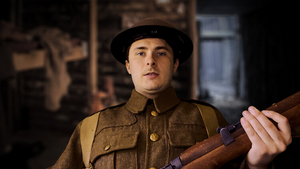Review: BIRDSONG, Original Theatre Online

![]()
The Original Theatre Company commemorate the 104th anniversary of the Battle of the Somme by bringing their adaptation of Sebastian Faulks's Birdsong to the screen.
For six weeks, actors at home were guided by creatives on Zoom, their performances filmed on iPhones against green screens, with digital backdrops, sound and effects added in post-production. Building on the techniques used to stream during the early stages of lockdown, Birdsong loses none of its power, relevance or clear sense of storytelling. Editor Tristran Shepherd describes this New Medium as 80% film, 20% theatre.
Most of the actors involved in this project have been drawn from casts of the stage production (last seen on tour in 2018), and directors Alastair Whately and Charlotte Peters, together with adaptor Rachel Wagstaff, have shaped this story of the Great War into something special to mark a horrific moment of conflict. If you saw The National Theatre's smash-hit War Horse, you will appreciate the use of music (performed by James Findlay), as well as the emotional heft of various men of war facing their private realities and dreams of home.
We are in the trenches and tunnels of 1916, where men with blackened faces, lice and casual camaraderie make small talk, help each other write letters, and escape into jokes of the darkest variety while the stench of decaying bodies blows in the breeze around them.
Jack Firebrace (Tim Treloar), a bluff, straight-talking, God-fearing man, and his colleagues from the Central Line joined up in 1912, "because the pay was better", but quickly realise that the possibility of a safe home return is fading day by day. Stephen Wraysford (Tom Kay) is an officer: superstitious, artistic, and prone to flashbacks to a love affair in pre-war France with the unhappily married Isabella (Madeleine Knight). A moment of kindness links the two men together.
Stephen's love story with Isabella is from a different time, at the end of the Edwardian age. As an "English guest" with the Azaires, he falls for the young wife of the house; their River Somme is a place of peace, of love, of happiness. Not yet littered with the bodies of "office workers and clerks" who are pointed towards their doom. Not yet fed by the seeds that becomes the flash of poppies which stand for each droplet of blood spilt by the dead and injured. In 1910, Stephen's liaison with Isabella is everything - and nothing.
The gift of Birdsong (the title comes from the skylarks who sing even while young men are mown down, "boots shaking as they filled him with bullets") is in the characterisations pulled from across the ranks. As well as Jack and Stephen on the frontlines, there are Arthur Shaw (Liam McCormick), glib Welshman Evans (Samuel Martin), raw underage recruit Michael Tipper (Max Bowden), and terse Scots officer Gray (Malcolm James).
We see a hint of what each man was like in civilian life, whether volunteer, conscript, or contracted army professional. In their letters they send and the conversations they have, we see the personal behind the bullets, mines, dirt and wounds. Lives end without warning, both in the state of war and in hospitals at home.
As performers, Treloar, Kay, and McCormick stand out, but each member of the company adds a crucial link to the chain of the story, as we progress towards the Armistice and some sort of reconciliation for those who have survived. Where reactions are required between two or more characters, screens are presented side by side or as a group; otherwise, each character is presented separately and mostly in extreme close-up.
Startling and innovative effects add to the general atmosphere of a lack of control and a sense of hopelessness. Backgrounds are static but are enough to give a feel of time and place, whether the filthy conditions where men are stranded together, or the house in which Isabelle's overbearing older husband (Stephen Boxer) prevents her from acting in the way she wishes.
We hear Faulks himself narrating between scenes, and when it would be impossible to depict the full impact of the "big push", we hear an abridged chapter telling us what is going on. We see images from the archives, ghostly faces in cramped bodies from a century ago. We see how Stephen can tell Gray, later, "I looked into your eyes that morning. I saw the void in your soul, and you saw mine".
In the individually filmed scenes, we feel the claustrophobia of tunnelling, the false optimism which comes from waiting and waiting to finish off the enemy and go back to wives, fathers, mothers, children, sweethearts. We feel the energetic sense of danger, the adrenaline that keeps men balancing on the edge of exhaustion, which lets them do sentry duty and keep one step ahead of the "Bosch".
Birdsong is a deeply emotional and powerful watch. I found it especially valuable when it showed the rank and file as people, rather than numbers. In Jack Firebrace and Michael Tipper, we follow small human tragedies all their own.
The direction and editing work together to really pull out the story and each person we see on the screen, and David Woodhead's production design mixed with Dominic Bilkey's sound design gives just the right effect for a viewer to feel they are involved completely in the stories being told. For a production to be created this way in such a short time is something the company should be celebrated for, and they have certainly achieved a poignant and mesmerising testament to those young men who died so needlessly in battle.
Birdsong is available online from 1-4 July with tickets from £10
Read our interview with Birdsong's adapter Rachel Wagstaff
Photo credit: Jack Ladenburg
Comments
.png)
|
.png)
|
Videos


